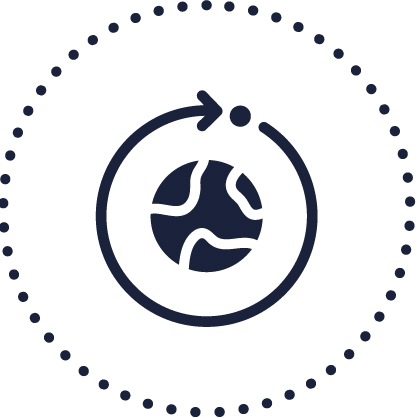Bordeaux Metropole
Bordeaux Métropole, 28 communes in the Nouvelle-Aquitaine region, covers almost 600 km2 with 800,000 inhabitants. Its key competencies, including transport, housing, waste, water, the economy and energy transition, strengthen its resilience to climatic and natural risks.

Overview of the project
Metropolitan Resilience Week 2023
As part of the definition of a resilience and risk management strategy, Bordeaux Métropole wanted to organize a resilience week co-constructed with local stakeholders. This animation program aimed to inform and acculturate elected officials, agents as well as the general public to climatic, natural and technological risks and territorial resilience to strengthen the power to act in the face of crisis situations and develop the capacity for resilience. of each one. Many formats were proposed: conferences and round tables, film debates, visits, serious games, exhibitions, participatory workshops. 49 events were organized throughout the country to raise awareness of risks and resilience on local issues such as land use planning, crisis management, housing and biodiversity. 50 partner contributors proposed and/or participated in the program. The mobilization was local but also national with the participation of actors such as SNCF, France Villes et Territoires Durables, AFPCNT. A European dimension was given with the participation of the Adaptation Mission of the European Commission and the cities of Munich and Bristol. This mobilization of stakeholders is a real asset for creating territorial dynamics and a common culture of resilience. Finally, Resilience Week was an opportunity to form the Citizen Reserve. Created by Bordeaux Métropole in 2023, the citizen reserve made up of around a hundred volunteer residents is committed to raising public awareness of major risks and strengthening support and assistance to populations in the event of a crisis or risky situation.
The Territorial Food Project
In order to bring coherence to all of the actions it carries out and to develop ambitions that match local challenges, Bordeaux Métropole has built, in collaboration with a group of stakeholders, its Territorial Food Project (PAT). This carries an ambitious action program of 45 thematic actions, which meet 12 political objectives. The Bordeaux Metropolis PAT aims to be systemic and integrative by addressing agricultural and food aspects in a transversal manner. Whether with neighboring territories, other local authorities (municipalities, department and region) and local agricultural and food stakeholders, collaboration is a key ambition of the PAT. The management of the PAT therefore relies on an innovative governance body – the Metropolitan Agricultural and Food Council (CAA) – designated to ensure its management in a multi-partnership approach with elected officials and local stakeholders. The Agricultural and Food Council is a collective and participatory body of actors concerned by agricultural and food issues, who co-construct strategies aimed at supporting the transition of the Bordeaux metropolis towards the emergence of a sustainable territorial food system. Today, the network with 5 years of experience has around a hundred member structures: education associations, municipalities and CCAS, catering and distribution players, agricultural players, neighboring territories, etc. This network and all the actions carried out over the past 5 years have led Bordeaux Métropole to the implementation of an operational program that constitutes the PAT, based on diagnostics and the sharing of common objectives of the agricultural and food system of our territory. .
Metropolitan Resilience Week 2023: Create a territorial dynamic and a shared culture on climate, natural and technological risks, with a view to building resilience in the Bordeaux metropolitan area; The Territorial Food Project: aims to support the territory's transition towards the emergence of a sustainable territorial agricultural and food system through multi-partner, shared governance.
Ongoing research
Project still in progress
Metropolitan Resilience Week 2023
49 events were organized throughout the metropolis. More than 1,124 people participated in this 1st edition. The report does not show the attendance of the 5 exhibitions on offer. Nearly 50 partners contributed to the definition of the proposed programming: local and national associations, institutions, municipalities, businesses, SDIS 33.
The programming for Metropolitan Resilience Week mainly welcomed adults. Some children were nevertheless able to participate in workshops, walks and exhibitions.
A strengthening of the mobilization of the student and school public is desired for 2024.
The Territorial Food Project
Launched less than a year ago, the qualitative results of the project are not known. The PAT will be subject to an evaluation in 2025 to study qualitative and quantitative elements including the achievement of its objectives, the progress of the actions launched and their results, the quality of the partnerships carried out, etc.
Also, the management team of the Agricultural and Food Council is currently drafting the annual report of the PAT and its governance, the results are not known to date.
Metropolitan Resilience Week 2023
The organization of the Resilience Week made it possible to respond to a strong challenge of setting the territory in motion on the issues of risk and resilience. Various stakeholders were mobilized: municipalities, associations, institutions. This mobilization had the effect of enriching the programming. Several points of view were thus able to be offered, the diversity of workshops and serious games showed the creativity of the associative fabric and the richness of the metropolitan territory through the organization of visits. The program certified by the Ministry of Ecological Transition has been included in the national Resilience Tour. Building on this experience, Bordeaux Métropole wishes to organize a new edition in 2024 by mobilizing new partners such as the wine industry.
The Territorial Food Project
Launched less than a year ago, the qualitative results of the project are not known. The PAT will be subject to an evaluation in 2025 to study qualitative and quantitative elements including the achievement of its objectives, the progress of the actions launched and their results, the quality of the partnerships carried out, etc.
Also, the management team of the Agricultural and Food Council is currently drafting the annual report of the PAT and its governance, the results are not known to date.
Metropolitan Resilience Week 2023: The French Association for the Prevention of Natural and Technological Disasters (AFPCNT) provided financial support for Resilience Week by covering the costs linked to the organization of an event registered in the program for an amount of €5,785.; The Territorial Food Project: The project is co-financed by European funds
organisation
Bordeaux Métropole, a public institution for inter-communal cooperation (EPCI) comprising 28 communes, is located in the Gironde department of the Nouvelle-Aquitaine region. Covering an area of almost 600 km2, Bordeaux Métropole is home to over 800,000 inhabitants (13% of the regional population). Its competencies cover transport, housing, waste, water, the economy, energy and ecological transition, and management of aquatic environments and flood prevention (GEMAPI). These skills are key to making the Metropole a resilient territory in the face of climatic, natural and technological risks.
Metropolitan Resilience Week 2023
15 Municipalities: Ambès, Artigues-près-Bordeaux, Bassens, Bègles, Bordeaux, Bouliac, le Bouscat, Cenon, Le Haillan, Floirac, Mérignac, Pessac, Saint-Aubin de Médoc, Saint-Louis de Montferrand, Talence
2 European cities: Munich and Bristol
Association & companies: Urban alternative, A’Urba, Terre et Océan, CDC Habitat, Collectif Rivage, Green in the cogs, France Sustainable City and Territories, the Climate Fresco, Future Act, Kéa Ecotherapy, Renaissance of European cities , S3PI, SNCF
Institutions: European Commission (adaptation mission), DREAL, Departmental Council of Gironde, SDIS 33, INRAE, ARDFCI, CSTB, University of Bordeaux, GPV Right Bank, EPA Euratlantique
The first citizen reserve created in France.






